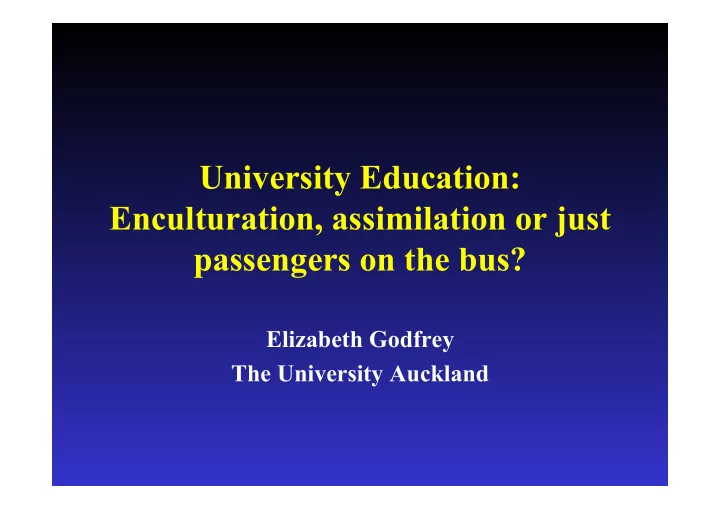

University Education: Enculturation, assimilation or just passengers on the bus? Elizabeth Godfrey The University Auckland
Education “Enculturation into the beliefs, practices, values and styles of discourse of a particular community”
Enculturation • Key factor in academic and social development • Early student engagement with university culture BUT • One culture or • Academic tribes ?
Culture • Shared knowledge and understandings • Guide actions and reactions => cultural norms • Culture involves process of learning
Case Study • One discipline’s calls for a “Culture Change” • Lack of common understanding of culture and processes of enculturation • Mismatch between espoused values and cultural norms • Developed a model to define culture of engineering education • Interpretive case study methodology • Applicable to disciplinary or institutional culture
Learning the Culture Students enter, motivated Older students – role models to succeed and fit in – observe and respond to Staff – shape practices and Artefacts artefacts, practices and rewards Practices behaviors Behaviors Peers- role models First Level Possibility of student norms changing practices Learn the way we do things round eg cheating causing change in assessment here - what is valued and rewarded practices Cultural After sufficient Rarely open to change by Values / Norms repetition and finding students – stable discipline what “works” develop with entrenched values and Second Level shared cultural norms. norms Unconsciously held – Beliefs and rarely discussed but recognizable by the Assumptions Third Level group
Orientation • Knowledge of multiple worlds • Orientation – urge to fit in and belong • Adaptation easier for those with experiences and personal values similar to new “world” • “Loners”, part time students – at risk..
First Year Engineering • Orientation – values made explicit • Entering a profession – community of practice • Sense of “belonging” and identity encouraged • Reinforced by common first year courses – even with a “class” of 500
Thinking like an engineer, kind of being taught it I suppose. The whole course is directed at making you think differently, that is how I feel it. I think that thinking as an engineer is thinking of the theoretical best solutions to problems and then the best practical way of doing it. As far as a "way of doing things" goes, a facetious response would be "so they get done", or possibly "using maths" …
By Final Year • Engineering can be very narrow, very focussed on one point, solve the problem goal oriented… I would put it down to our training, the way we are taught to think and act. • I found it hard until I got into the engineering way of thinking …the way of analysing a problem and working out how to go about solving it …you are not really taught it …you sort of pick it up
How do we Manifest what we value? Teaching and assessment practices reinforce for students the beliefs and values shared by staff, but also lead students to unintended outcomes and cultural norms • Include courses and content • Role model Behaviours and Practices • Reward - Assessment
Courses and content Forefront value of communication and technical skills => include one course per year You do have to think about that, they have been drumming it into you. Engineering is communicating, you have to know how to write, and how to talk with people and communicate (Angus, 1st year)
But … I think they tended to marginalise the information about environmental stuff. Maybe they should have it integrated into all the papers if they really value it... What they are saying in their values is that this stuff is not an important part in engineering -it is an aside that we throw in because we have to, but it is not a core part of engineering. (Megan, Civil 4th year student)
Tacit assumptions Sometimes taken for granted, rarely articulated, shared understandings - the role of Mathematics • In the Engineering way of thinking truth and reality were proven and described by mathematics. • Status and worth
Role of Mathematics Mathematics as an efficient, effective means of communication “The line Σ F y = m a c 200g – T c = 200(a c ) in the model answer was as good as a sentence to me” “We use maths like a language – a language to express ideas” Mathematics is a nice vehicle for delivering these ideas. I don’t think you could really function without mathematics in these sorts of systems”
Espoused Values =/= Norms • Value group projects and team work – assess individually • Value understanding – assess rote learning and application of formulae • Value deep learning approaches – course workload precludes? Go for grades. • Value co-operation and team work – reality of cheating and plagiarism
Implementing the model Our behaviours and practices must explicitly reflect and manifest our desired values and goals. • Need to be clear about our learning objectives - what we value, why we do what we do • Need to make these explicit in our teaching – role model, content, teaching style… • Reflect these espoused values in our assessment methods Have students internalised these values?
Is enculturation necessary for success? • Passenger – little understanding past the first level of culture • Assimilated – strategic adoption of values and norms to fit in and succeed • Enculturated – shared beliefs and assumptions – “what it means to be an engineer”
Conclusion What we do, what we say and what we write must reflect and manifest the attributes, values and goals we believe in, as explicitly as possible. If not, students will interpret for themselves what they believe is valued and their learning outcomes, values and cultural norms will reflect that interpretation.
Recommend
More recommend